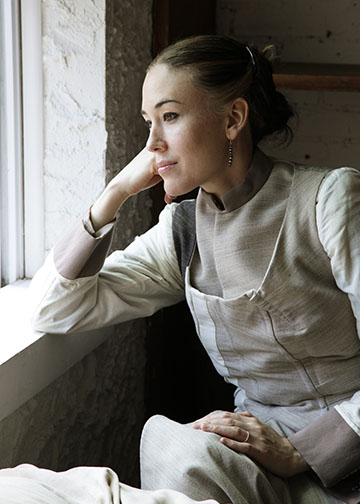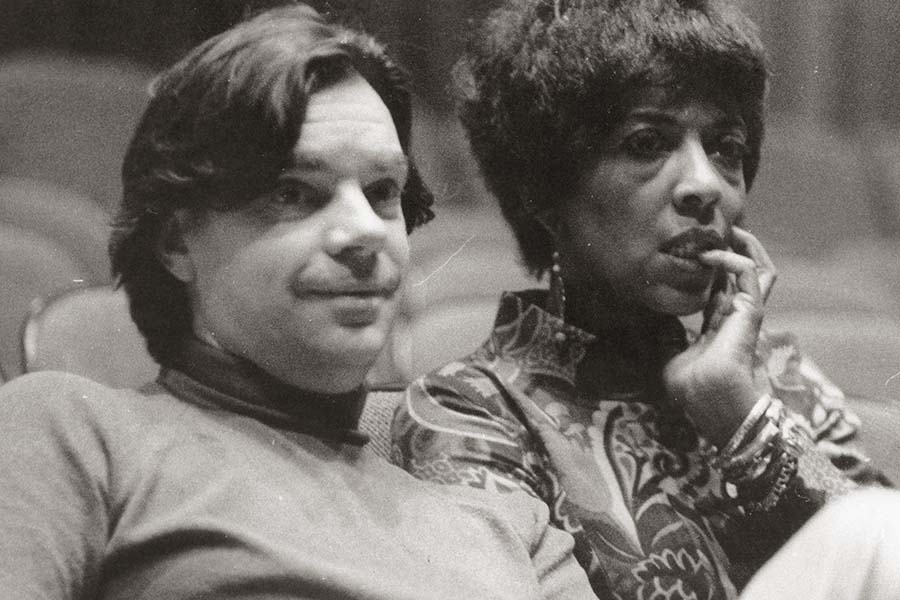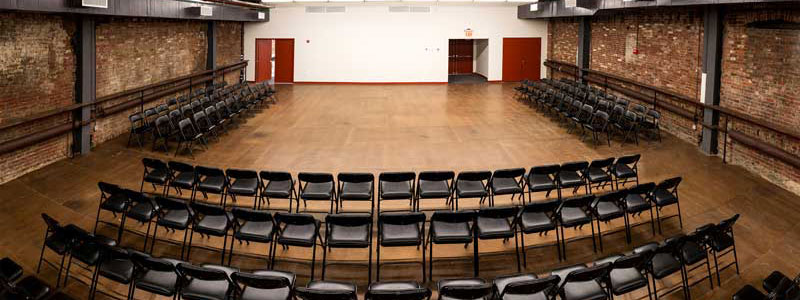Ellen Stewart, founder and namesake of La MaMa Experimental Theatre Club, was a singular force in the American theatre. Her modest beginnings in downtown and Off-Off-Broadway theatre have engendered a long and distinguished list of alumni playwrights, directors, actors, and designers who now number more than 150,000 and hail from more than 70 nations. Indeed, along with the U.S. artists she championed for more than five decades, Stewart also introduced such international giants as Grotowski, Suzuki, Barba, Serban, and Kantor to American audiences, and toured American companies to dozens of countries around the globe, making her an unofficial goodwill ambassador of theatre.
Identifying La MaMa as a New York theatre is accurate in the geographical sense only. It might be more apt to think of it as the international theatre of the East Village, in accordance with Stewart’s belief that the local is global and the global local. That philosophy is maintained by Stewart’s designated successor, artistic director Mia Yoo. In the years since Stewart’s death at the age 91 in 2011, Yoo has overseen the expansion of the theatre’s programming and the opening of a new La MaMa space, appropriately called the Downstairs, used for events that engage both the surrounding and the international communities.

“Ellen began La MaMa out of a necessity for community that grew with the theatre,” explains Yoo, who joined La MaMa’s Great Jones Repertory Company in the 1990s and began studying with Stewart as a part of TCG’s Future Leaders mentorship program in 2005. “Rethinking the past and reimagining the future, we need new spaces, new ways of making theatre, and new ways to serve our community. The Downstairs is a response to those needs.”
The new space is below the Ellen Stewart Theatre (formerly known as the Annex), in the basement of 66 East 4th Street—a building so deep that it also has windows looking out on East 3rd Street. Those theatres and the two at 74 East 4th Street, the First Floor Theatre and the Club, plus La MaMa La Galleria on Great Jones Street, where poetry readings and performance art take place among art shows, bring the total number of dedicated La MaMa performance spaces in the East Village to five. La MaMa offices are above the lobby of the Ellen Stewart Theatre, while on the level between the theatres the immense La MaMa Archive/Ellen Stewart Collection is housed. There are three rehearsal spaces on Great Jones Street.
From its humble origins as a tiny basement space on East 9th Street in 1961, La MaMa has grown into not only an international theatre but an indispensable urban arts complex for downtown New York City. Among the ongoing La MaMa programs for residents of its neighborhood as well as for the theatregoing public are the Human Beat Box Festival, Safe Harbor Indigenous Collective’s Indian Market, La MaMa Moves!, La MaMa Su Casa: Studies in Puppet Form, Coffeehouse Chronicles, La MaMa Kids, Electric Poetry, and La MaMa’s Squirts. As La MaMa’s creative footprint continues to expand, so does the vision and the desire to connect people.

Entrusted with this daunting legacy, Mia Yoo collaborates with managing directorMary Fulham, producing director Beverly Petty, curator of the Club and La MaMa Moves Nicky Paraiso, and a creative staff of more than 50 people. Yoo has also expanded the theatre’s local outreach, serving and representing both young and old residents while embracing the La MaMa tradition of presenting a balance of new theatre artists along with established figures from the avant-garde.
She has also fortified La MaMa’s existing global relationships with, perhaps most prominently, their European home, La MaMa Umbria International—an artist’s retreat, workshop, theater, and arts complex outside Spoleto, Italy—and CultureHub, a continent-bridging company forged from a 30-year relationship between La MaMa and Seoul Institute of the Arts. CultureHub is a collective of Americans based in New York and Koreans based in Seoul, which creates space for building community via devised productions, classes, and creative research.

In February at the Downstairs, CultureHub’s Hi-Fi / Wi-Fi / Sci-Fi, Predictions Past Present and Future epitomized the global/local, young/old, newcomer/veteran paradigm. Director Billy Clark cast three Off-Off-Broadway veterans, Agosto Machado (an original member of the Playhouse of the Ridiculous), Valois Mickens (who has performed with the Great Jones Repertory Company of La MaMa since the 1970s), and Korean actor Kan Man Hong (a member of Great Jones since the 1990s), alongside two relative newcomers, John Gutierrez and Yeena Sung. The text comprised four short plays (one commissioned for this work) by octogenarian playwright and raconteur Robert Patrick, who got his start at Caffe Cino and Café La MaMa in the early 1960s.
Employing multiple cameras, the production featured live and recorded images projected onto several giant screens surrounding a milling audience, while actors in Seoul and New York performed together with a built-in five-second delay. In this way, the medium for storytelling became part of the narrative in a larger meditation on communication, technology, synchronicity, language, and the future.
Whether it breathes in the same room or spans oceans, community is at the center of Yoo’s mission, as it was for Stewart. Possessing the kind of warmth her predecessor was known for, Yoo tells anyone who will listen about how crucial intergenerational connections are to nurturing creativity and diversity. She encourages all La MaMa programming to engage artists from different generations.
One such program, Coffeehouse Chronicles, derives its name from the coffeehouse status many Off-Off-Broadway theatres had to officially assume to remain open in the face of inflexible zoning laws in the 1960s. Curated by Michal Gamily, these events have recently explored the work of costume designer Gabrielle Berry, the Target Margin Theater, Greek director Theodora Skipatares, John Vaccaro and the Playhouse of the Ridiculous, and the 50th anniversary of the musical Hair, which had its beginnings in a workshop at La MaMa. A vivid illustration of the scope and value of the Coffeehouse Chronicles was occasioned last December by a celebration of the 40th anniversary of PAJ: A Journal of Performance and Art, including a tribute to cofounder and editor Bonnie Marranca. In a time of cyber scholarship and seismic changes in the publishing world, the event spotlighted PAJ’s impressive output of plays and critical writing for a new generation.

Ozzie Rodriguez, who started as an actor at La MaMa in 1967 and began directing plays there in the early 1970s, is a tireless caretaker of these invaluable intergenerational links. As archive director of the private collection, Rodriguez conducts tours for college classes and theatre artists, as well as offering guidance to scholars and researchers. An eclectic repository of photographs, programs, scripts, posters, and more, the collection also maintains nearly six decades of props, costumes, set pieces, puppets, musical instruments, and sculpture, and a massive assemblage of video and audio recordings that offer rare glimpses of the performers and stages of the early Off-Off-Broadway movement.
Whether the content is global or local, diversity and variety continue to be hallmarks of La MaMa. For example, this month the Free Theatre of Belarus is premiering their third production in the Ellen Stewart Theatre, Burning Doors, a devised piece about government suppression featuring Maria Alyokhina, a member of Pussy Riot (Oct. 13-22). In November at the Downstairs, Safe Harbor Indigenous Collective will premiere Murielle Borst-Tarrant’s Don’t Feed the Indians, a satire loosely based on The Divine Comedy that employs a comedic Native American aesthetic to tell a story of cultural appropriation and the commerce in indigenous stereotypes.

Last spring in the Downstairs, David Diamond, coordinator of La MaMa Umbria International, led groups of neighborhood senior citizens through physical exercises and theatre games from Augusto Boal’s Theatre of the Oppressed. Over the summer, Columbian puppeteer Federico Restrepo brought La MaMa Su Casa: Studies in Puppet Form to the United Jewish Council for the East Side and the Sirovich Center to introduce senior citizens to the use of puppetry in dance and storytelling.
For those nearer the beginning of life’s journey, La MaMa Kids offers theatre workshops and performances for children and their parents twice monthly, led by artists such as French-American vocal virtuoso Gino Sitson or beatbox master Kid Lucky. Veteran La MaMa artist Lois Weaver (one half of the Split Britches company, with her partner Peggy Shaw) recently ran an intergenerational workshop in which children explored how the past can help them imagine their futures.
Another meeting of the generations takes place at La MaMa’s Squirts every January. Created and curated by Dan Fishback, Squirts invites up-and-coming queer artists to take the stage. Last January Fishback matched younger artists with established voices from the LGBTQ community for a series called “Generations of Queer Performance.” At the evening I attended, the transgender actress and model Theda Hammel was paired with trans legend Kate Bornstein. After regaling the assembled with hard-knock wisdom gained from decades of activism and visibility, Bornstein offered each member of the primarily under-30 audience a “Get Out of Hell Free” card, which bore this rather generous offer: “Do whatever you need or want to do in order to make life worth living. Love who and how you want to love. Just don’t be mean. Should you get sent to Hell for doing something that isn’t mean to someone, I’ll do your time in Hell for you. Kiss, kiss—Kate.”
Thomas Keith, according to Ellen Stewart, was La MaMa’s first intern. He now works as an editor and teaches theatre and acting in New York City, including at Pace University.


